Zechariah 3:1 – Then he showed me Joshua the high priest standing before the angel of the Lord, and Satan standing at his right hand to accuse him.
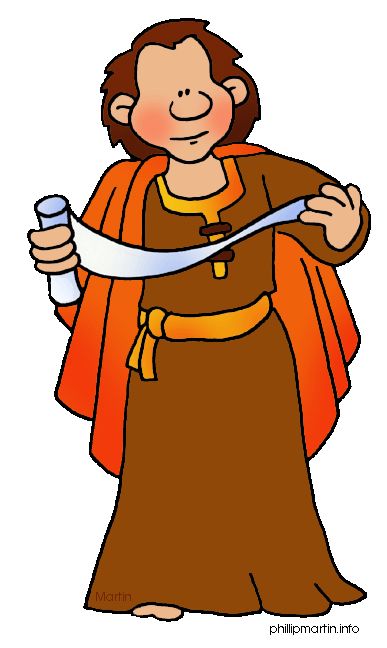
Now we come to the fourth vision of Zechariah.
Joshua the high priest – There can be no doubt that Joshua the high priest was the man that Zechariah saw in this vision. We know this because Zechariah was a priest as well as a prophet, which means that Joshua was essentially his boss.
Joshua returned to Jerusalem from the captivity and served as the high priest during the tumultuous years when the temple was being rebuilt. As such, he faced a lot of pressure and danger from the enemies of Israel, who did everything in their power to stop him. At the same time, he was the spiritual leader of the Jews who were very discouraged. His ministry was full of difficulty and trials.
As the spiritual leader of the nation, Joshua was expected to teach the commands of God and provide an example of holiness to the Jews he served. However, we know that his sons (and possibly he himself) had taken foreign women as their wives (Ezra 10:18). Even if this was not the case for Joshua, we know that he, like every other person in the world, was not blameless. He was a sinner.
Nevertheless, he was seen in the vision to 'stand before the angel of the Lord'. This means that in the vision, Zechariah saw him serving in his capacity as high priest.
The angel of the Lord – We can also be fully confident in the identity of the angel of the Lord – it is none other than Jesus, our Lord and Savior, who was also present in Zechariah's other visions.
His identity is further confirmed by the actions he takes later in this vision – he rebukes Satan, advocates for his people Israel, removes sin and clothes Joshua with righteousness. Only Jesus has the power and authority to do these things.
Satan – This guy needs no introduction; we all know him. Just as his name indicates, he is our adversary, our enemy and our accuser.
At his right hand – This is an interesting detail. Is there any significance to the fact that Satan is standing at Joshua's right hand? Bible commentators think there is. In fact, they offer two possible explanations for this phrase.
First, the phrase 'at his right hand' may indicate that Satan was in a position to hinder the work of Joshua/Israel in rebuilding the temple and walls of Jerusalem. He did this by stirring up enemies against them (i.e., Sanballat – Nehemiah chapters 2, 4 and 6).
This is certainly a valid interpretation which is true in every age. Even now Satan positions himself to oppose, hinder, intimidate and otherwise stop the church from continuing to spread the gospel message and build the kingdom of heaven.
He does this by working through ordinary people who are deceived by his lies. These workers of iniquity often cause Christians grief, sorrow and frustration. But we must remember that these people are not the real enemy. As Zechariah's vision shows us, we are actually fighting against spiritual principalities and powers (Ephesians 6:12). Sadly, these people are being used by Satan as pawns in his war against God. They need prayer, not judgment or condemnation.
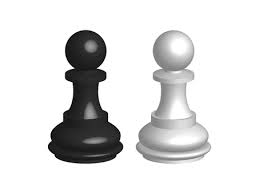
A second explanation of 'at his right hand' says that Satan takes this specific position because the right side of the courtroom is the normal position for the prosecutor (Psalms 109:6).
In this scenario, Satan is fulfilling the role of the prosecutor – he is filing 'legal' charges against Joshua in the courtroom of heaven. This is significant because in this vision, Joshua sometimes represents the entire Jewish nation and/or God's people. (We will point out these instances as we go through the vision.) If Satan is successful in bringing judgment on Joshua, it will fall upon us too, as we are all guilty of sin.
To accuse him - Satan is accusing the defendant of sin and attempting to prosecute him to the fullest extent of the law of God. And make no mistake, under the laws of the covenant, Joshua (and all mankind) clearly deserved death.
Zechariah 3:2 – And the Lord said to Satan, "The Lord rebuke you, O Satan! The Lord who has chosen Jerusalem rebuke you! Is not this a brand plucked from the fire?"
And the Lord said unto Satan, "The Lord rebuke you" - On the surface, this seems like an odd phrase. Why would the Lord say 'the Lord rebuke you' as if he were speaking in the third person?
The answer is found in the triune nature of God. This is a very difficult concept for us to wrap our minds around, however, it is fully supported in scripture. One of the best known descriptions of the Trinity is the Westminster Confession:
There is but one living and true God. In the unity of the Godhead there are three persons, of one substance, power and eternity – God the Father, God the Son, and God the Holy Spirit. The Father is one, neither begotten or proceeding; the Son is eternally begotten of the Father; the Holy Ghost eternally proceeding from the Father and the Son.
In this particular case, we have the angel of the Lord (Jesus) saying to Satan, 'the Lord (Father God) rebuke you'.
The Lord rebuke you, O Satan – This phrase is a form of intercession by Jesus to Father God on behalf of Joshua.
Keep in mind that 'rebuke' means to silence, to restrain or to reprehend sharply. A rebuke can also refer to a reprimand as well as chastisement or punishment.

This statement of Jesus is essentially a plea for Father God to silence/restrain/chastise Satan so that he cannot continue to accuse Joshua (who represents all of God's people).
In addition to silencing his verbal accusations, this statement is also a request to confound Satan's schemes and restrain him from doing mischief and opposing God's people.
What was the outcome of Jesus' intercession?
As we would expect, he was successful. This was evident back in Zechariah's day, as the Jews were ultimately successful in rebuilding the temple and the city walls.
However, its highest fulfillment came when Jesus died and rose again. Since his blood was/is capable of fully paying the price of our sin, Satan could no longer accuse us before the Father. Thanks to Jesus, Satan's accusations are now baseless because Christians are fully justified in God's sight.
The Lord who has chosen Jerusalem rebuke you–Joshua (God's people) are acquitted of all charges, not because Satan was incorrect in his accusations, but because of God's choice. He chose love and mercy over judgment; he chose to provide his Son as the atonement for our sin.
James 2:13 - mercy triumphs over judgment.
It is interesting that we find Jesus rebuking Satan twice. Did you notice that no lengthy discussion or trial takes place? God simply silences our adversary with a single phrase. This indicates the absolute certainty of Satan's plans and accusations being frustrated by our Father. However sinful God's people currently are, God has chosen them/us as his people and Satan cannot overturn that decision.

Is not this a brand plucked from the fire - This refers to Joshua, who is representative of all of Israel/God's people. A 'brand' is a stick or piece of wood that has been partially burnt in a fire. Fire represents punishment and suffering.
Like a branch that is cut off from the tree, the priesthood had ceased when Israel went into captivity and Solomon's temple was destroyed. Though God had appointed Joshua as high priest, the priesthood had not yet been restored to its former glory. The same could be said of the entire nation – it ceased to exist politically when it went into exile. Even though God allowed his people to return to Jerusalem, their current situation couldn't have been worse.
God's people were like dry sticks that had been cast into a fire and half burnt – they were separated from God, they were unprofitable, unfruitful and in danger of being consumed by divine wrath (which they justly deserved).
Clearly, God did not simply ignore or sweep the sins of Israel under the rug. He knows Israel is guilty of breaking the law and that they deserve the punishments that Satan is lobbying for them to receive.
But God has chosen to extend grace, mercy, and love to them. By his mighty power, he plucked a remnant out of captivity and protected them from destruction like a burned stick grabbed out of a raging fire.
The meaning is that God is rebuking Satan once again, telling him to stop imputing sin/death to those on whom he has chosen to show mercy.
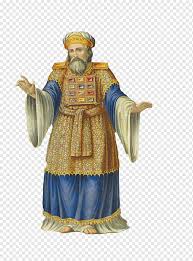
This was a clear and significant message to the people of Israel – although their current situation looked grim, God was not finished with them yet. He had chosen to favor the high priest (and his people), despite their past mistakes.
Thus, the good work that God had begun in them during the days of Abraham would continue – they would overcome their enemies and finish the work God had called him to do. This reassures Israel that God is not like men – he does not grow weary of doing good; he is faithful to his promises. For their part, Israel needed to stop looking at the natural realm and grasp God's promises by faith.
Again, we can point to the completion of the temple/walls of Jerusalem by a remnant of the Jews as a fulfillment of this promise.
We can look back in history and see another fulfillment as well. It occurred during the days of the incarnation. John the Baptist warned the religious leaders to repent, lest they fall under judgment and be cut off from God once again:
Luke 3:9 -And now also the ax is laid unto the root of the trees: every tree therefore which brings not forth good fruit is cut down and cast into the fire.
Although many refused to repent, God once again saved a remnant of Israel, despite the persecution of Rome and other world powers.
Is this a message the church should embrace? I believe so. Gentiles are sinners who deserve punishment just as much as the Jews. Satan looks to condemn us just as he did Joshua the high priest and the children of Israel.
But once again, God has extended mercy instead of judgment. The sacrifice of Christ cleanses both Jews and Gentiles from sin; Gentiles have been welcomed into the kingdom of heaven. All people can now be fully justified in God's sight. All Christians live as restored priests in the kingdom of God:
1 Peter 2:9 - But you are a chosen generation, a royal priesthood, a holy nation, a people for his own; that you should show forth the praises of him who has called you out of darkness into his marvelous light:
If we repent of our sin we are no longer dry branches cast into the fiery furnace of punishment – we are living branches abiding in Christ and bearing fruit for his kingdom and glory:
John 15:5 - I am the vine, you are the branches: He that abides in me, and I in him, the same brings forth much fruit: for without me you can do nothing.
Despite the love and mercy of God, many churches today are asleep – they indulge in sin, embrace the world and exhibit indifference toward Christ. However, we should not lose hope because God always has a faithful remnant in every generation. He will use us to awaken other Christians from sleep and to bring the unsaved into his kingdom.

We can take comfort in knowing that once he has begun a good work in us, he will continue to perform it, until Christ returns (Philippians 1:6).
Zechariah 3:3 – Now Joshua was standing before the angel, clothed with filthy garments.
Standing before the angel–In this case, the priest was 'standing' or pictured as ministering before the Lord. In other words, when Zechariah saw Joshua in his vision the priest was performing the duties of his office as Jesus looked on. He was most likely making atonement for the sins of Israel.
Clothed with filthy garments–As Joshua ministered, Zechariah could not help but notice his clothing. The garments referred to here would be the high priestly robes, worn as the priest ministered in the temple. The vision implies that this was not an isolated incident – his garments were perpetually nasty and disgusting. What does that mean?
Scripture tells us that filthy garments represent general defilement by sin:
Isaiah 64:6 - But we are all as an unclean thing, and all our righteousness are as filthy rags; and we all do fade as a leaf; and our iniquities, like the wind, have taken us away.
(See also Isaiah 4:3-4, Proverbs 30:12, etc). The appearance of the priesthood was vile because God would not overlook its sin/shame.
However, there was good news too – a time of restoration was coming. God would eventually provide a high priest who was free from sin and who could make atonement for the sin of all people (Hebrews 3:1, 4:14, 6:20, etc).
Zechariah 3:4 – And the angel said to those who were standing before him, "Remove the filthy garments from him." And to him he said, "Behold, I have taken your iniquity away from you, and I will clothe you with pure vestments."
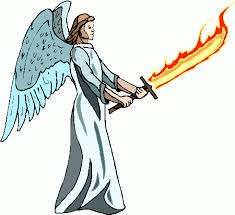
Again, the angel represents Jesus. So in this verse, we find Jesus instructing other angels to remove the filthy garments from Joshua the priest.
As we just noted, the filthy garments are representative of the sin of not only Joshua, but the entire nation of Israel. The removing of these garments denotes God's pardoning of the pubic and national sins of the Jews, as well as their restoration to his favor and protection.
Isaiah 61:10 - I will greatly rejoice in the LORD, my soul shall be joyful in my God; for he has clothed me with the garments of salvation, he has covered me with the robe of righteousness.
So, let me ask you this – has God changed from that time to this? Of course not! We know he never changes (Malachi 3:6). This gives hope to the nation of America. If God was willing to pardon the public and national sins of Israel, he is willing to do the same for us, if we will repent and seek his face.
I have taken your iniquity away from you – Christ took Joshua's iniquity upon himself, made atonement for it and then cast it as far from him as the east is from the west (Psalms 103:12). He also removed guilt from his conscience and allowed him to know that he was pardoned (Romans 8:16). What a powerful Savior we serve!
I will clothe you with pure vestments – The new robes that Joshua received were festal robes; they were used in times of celebration and special events. These robes are costly and gorgeous. They represent Messiah's imputed righteousness.
Zechariah 3:5 – And I said, "Let them put a clean turban on his head." So they put a clean turban on his head and clothed him with garments. And the angel of the Lord was standing by.
After hearing the Lord's command to clothe him with clean garments, Zechariah asks for an added benefit – that a clean turban be placed upon Joshua's head. The Lord granted this request.
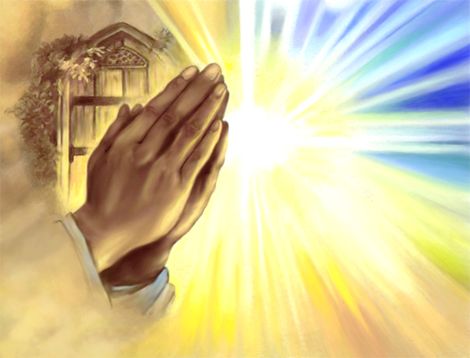
This seems rather odd on the surface, because it would only make sense that the dirty 'turban' would be replaced when the filthy garments were changed. The fact that Zechariah prayed for the turban and it was granted means there is a deeper meaning here.
The Hebrew word translated 'turban' is 'tsanph', which is not the term used for an everyday turban worn by common people. It referred to a miter or headdress worn by princely persons and kings. The same term is used in Job 29:14 and Isaiah 62:3 and it is synonymous with 'mitsnepheth', the technical word for the tiara prescribed for the high priest in the law.
What was different about the headdress of the high priest?
The turban/miter/headdress of the high priest had a golden plate fastened upon it which read "Holy to the Lord":
Exodus 28:36-38 - And you shall make a plate of pure gold, and engrave upon it, like the engravings of a signet, HOLINESS TO THE LORD. And upon the front of the turban it shall be. And it shall be upon Aaron's forehead, that Aaron may bear the iniquity of the holy things, which the children of Israel shall hallow in all their holy gifts; and it shall be always upon his forehead, that they may be accepted before the LORD.
The engraved plate described the high priest as being 'holy to the Lord'. This reflected the fact that he was called to bear the guilt of the children of Israel. He was the only one who was authorized to bear this sign. If anyone else tried to bear it, they would die because of their sin.
So, the prayer for a clean miter to be placed upon Joshua's head was a request that he should not only be fully clean/free from sin himself, but that he should also be qualified to accomplish the expiation (sacrifice of atonement) of the sin of the Israelites.
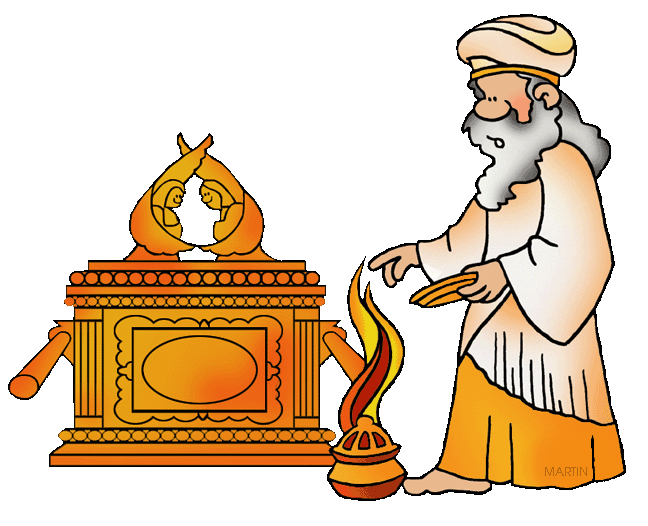
God granted the prophet's request. This was significant to the Jews in the days of Zechariah because it proved to them that the priesthood would eventually be fully restored. They would once again be able to participate in sacrifices, celebrate the festivals and enjoy fellowship with God.
It is significant for the church as well. Because we are a generation far removed from the days of Zechariah, we can clearly see the ultimate fulfillment of this request – Jesus the Messiah, our great High Priest, came to earth to atone for our sin once and for all. As the only begotten Son of God, he was the only person qualified to undertake this task and restore fellowship between the church and Father God.
Zechariah 3:6-7 – And the angel of the Lord solemnly assured Joshua, "Thus says the Lord of Hosts: If you will walk in my ways and keep my charge, then you shall rule my house and have charge of my courts and I will give you the right of access among those who are standing here."
The Lord is now going to reveal the reason why he has restored the priesthood. He is going to make some astonishing promises to his people, which will cause them to rejoice and take courage; they will be strengthened to accomplish the task set before them.
However, the very first word from the Lord is 'if'. This implies that Joshua (and the children of Israel) must make some choices. Although choosing the ways of the Lord will require courage and sacrifice, rich rewards await those who choose this path.
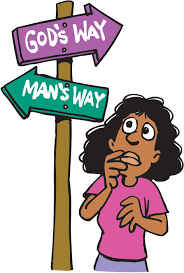
The same can be said of us. Each of us chooses what to do with our time, what to put into our minds, what to say with our mouths, what to do with our money, etc. Choosing the ways of the Lord still requires courage and sacrifice, and rewards still await those who follow Christ. What choices are you making?
The phrase 'walk in my ways' was commonly used in the Old Testament (Deuteronomy 5:33, Joshua 22:5, I Kings 3:14, II Chronicles 6:31, etc). It refers to living life in such a way that you are obedient to the moral, ceremonial and lawful commands of God. We often refer to this as personal holiness.
The phrase 'keep my charge' refers to the faithful and honest discharge of the official duties which God gave to the high priest (Numbers 3:7).
If Joshua will do these two things, then blessings await him:
He would rule God's house and have charge of God's courts – In this case, the term 'God's house' refers to the temple and/or the Israelites. The meaning is that the high priest would lead the people in all things pertaining to the law of God. He would also preside over the temple. This included judging those who ministered in the sanctuary, overseeing the services of the temple and Holy of Holies, and keeping idolatry of all kinds out of the outer courts.
The office of the high priest (and the priesthood in general) was not in existence during the captivity. It had since been restored, but was contemptible due to the sins of the priests (especially the sin of marriage with foreign women). However, God was restoring that office to its former honor and glory; it would again be an honor for any man to hold a priestly office. This was a physical blessing.
Have right of access among those standing here – Those who were standing in this vision were the angels of heaven, who stood in the Lord's presence and ministered to him. There is no doubt that the high priest is being promised full and free spiritual access to God.
Some think he is given the right to minister before God alongside the angels. Others believe it means he has the right to pass through the ranks of angels and directly enter the presence of God to discharge his priestly duties. In either case, this is clearly a spiritual blessing.
Again, blessings (both physical and spiritual) await those who walk in God's ways and earnestly seek to fulfill the duties he has assigned to them.
Zechariah 3:8 – "Hear now, O Joshua the high priest, you and your friends who sit before you, for they are men who are a sign: behold, I will bring my servant the Branch."

Joshua is the high priest. His friends or companions are the other priests who served in the temple. They were to be a sign of something that was to come. What was it?
As we look back on the vision, we find two major points that come to light. One is the presence of sin, which makes us guilty before God (hence, the accusations of Satan). The other is full forgiveness of this sin and restoration of fellowship with the Lord, both of which are entirely due to his mercy and grace.
The priesthood was a part God's mercy/grace, because their purpose was to make offerings for the sins of the children of Israel:
Leviticus 9:7 - And Moses said unto Aaron, Go unto the altar, and offer your sin offering, and your burnt offering, and make an atonement for yourself, and for the people: and offer the offering of the people, and make an atonement for them; as the LORD commanded.
Unfortunately, those sacrifices had to be repeated on a regular basis, for the blood of bulls and goats could never take away sin (Hebrews 10:4). But that was okay for the moment, because the sacrifices, actions and duties of the priests were a sign of what was to come: The Branch.
Isaiah 11:1-4 - And there shall come forth a rod out of the stem of Jesse, and a Branch shall grow out of his roots: And the spirit of the LORD shall rest upon him, the spirit of wisdom and understanding, the spirit of counsel and might, the spirit of knowledge and of the fear of the LORD. But with righteousness shall he judge the poor, and decide with equity for the meek of the earth: and he shall strike the earth with the rod of his mouth, and with the breath of his lips shall he slay the wicked.
Jeremiah 23:5-6 - Behold, the days come, says the LORD, that I will raise unto David a righteous Branch, and a King shall reign and prosper, and shall execute justice and righteousness in the earth. In his days Judah shall be saved, and Israel shall dwell safely: and this is his name by which he shall be called, THE LORD OUR RIGHTEOUSNESS.
(See also Isaiah 4:2, Jeremiah 33:15, Isaiah 53:2). As you already figured out, The Branch is one of the titles give to the Messiah, Jesus Christ (Jesus was of the line of David, son of Jesse).
The priests/priesthood of the old covenant was a picture or a foreshadowing of the Messiah. While that seems like common knowledge to us, this was a mind-blowing revelation to the Jews back in that day.
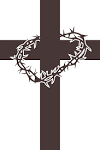
Jesus is the only person who has ever fully and perfectly walked in the ways of God (obeyed his commands) and kept his charge (fulfilling the duties God assigned to him). He is our perfect and permanent high priest, who only had to make one sacrifice for our sin – his own life on the cross.
As we would expect based on this vision, Jesus now rules God's house (the church), which is made up of Jews and Gentiles alike:
Colossians 1:18 - And he [Jesus] is the head of the body, the church: who is the beginning, the firstborn from the dead; that in all things he might have the preeminence.
Furthermore, Jesus has the full right of access to God the Father. He makes use of that access all the time as the mediator between God and man.
So the Jews, who were despondent over the current state of their nation, religion, and temple were filled with new hope. The priesthood, which represented forgiveness of sin and fellowship with God, was not going to perish. Though things looked grim at that moment, they had the assurance that the priesthood would continue until the promised Messiah would come.
Zechariah 3:9 – "For behold, on the stone that I have set before Joshua, on a single stone with seven eyes, I will engrave its inscription, declares the Lord of Hosts, and I will remove the iniquity of this land in a single day."
I have set – This verse is a further expansion of the promise of the Branch. The verse clearly indicates that it will be God himself who causes this stone to be set in place, and that this will happen in a time that was future to Joshua the high priest and Zechariah the prophet.
The stone I have set before Joshua – What stone is God talking about? Because of the context of the verse and the fact that the stone is set before the high priest, we can conclude that it has something to do with the remission of sin.
The thoughts of the men of Israel probably went immediately to the foundation stone of the rebuilt temple. But this could not be the stone God referred to, because that stone had already been set; it was not a future event. Furthermore, it had not been engraved by God and it certainly had no known connection to seven eyes!
But, as our generation knows, there was a stone which God eventually set in the earth that was connected with the remission of sin. It was prophesied by Isaiah:
Isaiah 28:16 - Therefore thus says the Lord GOD, Behold, I lay in Zion for a foundation a stone, a tested stone, a precious cornerstone, a sure foundation: he that believes shall not be in haste.
Despite the prophesies of Isaiah and Zechariah, that corner stone would end up being rejected by the Jewish priests many years later (Psalms 118:22, Matthew 21:42).
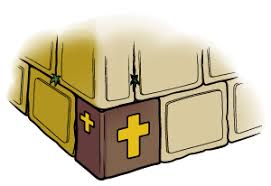
Nevertheless, Jesus Christ was and is that stone. The foundation of the church rests upon him – a tried stone, a precious corner stone:
Ephesians 2:20-21 - And are built upon the foundation of the apostles and prophets, Jesus Christ himself being the chief cornerstone; In whom all the building fitly framed together grows unto a holy temple in the Lord:
Seven eyes – Scripture makes multiple references to the eyes of God. Zechariah makes mention of God's seven eyes which run to and fro on the earth (4:10). In the New Testament prophesy of Revelation, the apostle John also makes mention of the eyes of God:
Revelation 5:6 - And I [John] beheld, and, lo, in the midst of the throne and of the four living creatures, and in the midst of the elders, stood a Lamb as though it had been slain, having seven horns and seven eyes, which are the seven Spirits of God sent forth into all the earth.
The seven eye description can only apply to Jesus Christ; he alone is a living being of manifold intelligence who possesses universal perception, insight and understanding. With such divine sight, he surveys and provides for the well being of the whole church.
Besides representing divine insight and understanding, the seven eyes are also an analogy for the sevenfold Spirit of God, which rested upon Christ without measure (John 3:34). We are also told that the fullness of the Godhead dwelt in Jesus (Colossians 2:9).
In other words, as individual believers, we may have one or even two spiritual gifts operating in our lives (word of knowledge, discernment of spirits, gifts of healing, etc), but ALL of these workings of Holy Spirit were at work in the lift of Christ without measure.
Engraved inscription – We know that the engraving has something to do with the costly and magnificent cornerstone. However, the exact words of the engraving and its ultimate meaning have not been revealed to us.
Nevertheless, some scholars believe the 'engraving' upon the stone are the five marks of crucifixion which Christ still bears upon his resurrected body. To those of us forgiven of sin, what marks could be more glorious or precious?
Remove the iniquity of this land in a single day – These words meant only one thing to the priests and people of ancient Israel - the Day of Atonement. This was the one day each year when the high priest entered the Holy of Holies to sprinkle blood upon the Mercy Seat of the ark. By doing so, the priest was able to make atonement for the sins of the people for a full year.
Although the children of Israel didn't fully understand this like we now do, the reference to removing sin in a single day referred to the day that Jesus died.
Zechariah 3:10 – "In that day, declares the Lord of Hosts, every one of you will invite his neighbor to come under his fine and under his fig tree."

'That day' can certainly refer to a specific 24-hour period of time. But it can also refer to a future era or dispensation of time. In this case, 'that day', is the era when The Branch would make a final atonement for sin. We refer to it as the gospel dispensation.
'Every man under his vine and fig tree' - This was a term used by the ancient Jews to describe a state of great peace and prosperity (I Kings 4:25, Micah 4:4). The act of enjoying leisurely fellowship with your neighbor indicates a lack of fear, anxiety or dread of imminent danger.
In the natural realm, it reflects a time of fellowship and joy between Jewish people who are no longer under the oppression of others.
In the spiritual realm, it reflects a time when people share the good news of the gospel with others. Christians abide in Christ and enjoy a fruitful and meaningful life; it is their greatest joy and pleasure to bring others into the family of God where they too can rest in their salvation without fear, anxiety or a dread of eternal damnation.
So, what can we conclude about the fourth vision of Zechariah?
Obviously, this vision (#4) is closely connected with the last vision. In the third vision, God had declared that he would again dwell in the midst of his people, protecting them and visiting them with blessings.
But in order to enjoy that kind of fellowship with him, the people must be purified; sin must be removed. To that end, God was reestablishing the priesthood to train the people in the ways of righteousness, and to intercede on their behalf before God's throne. The high priest was once again empowered to offer atonement for the sin of the nation once a year.
The ultimate fulfillment of this promise occurred when the Messiah, Jesus Christ, came to earth to become our high priest. He offered a single, eternal sacrifice for sin – himself. Thus, the impurity of sin has been removed from the human race and Satan no longer has any grounds on which to accuse us before God. Hallelujah!
Let me offer you some encouragement:
In Zechariah's vision, we saw a picture of Joshua as the high priest, the one who stood in the gap between God and man. Part of his ceremonial clothing was a miter or turban with a golden plaque that read 'Holy to the Lord'.
According to the New Testament, all Christians in the age of grace are also priests before God:
1 Peter 2:5 -You also, as living stones, are built up into a spiritual house, a holy priesthood, to offer up spiritual sacrifices, acceptable to God by Jesus Christ.
As such, it is our honor to be a 'living stone' or a part of the church of Jesus Christ. Our greatest privilege is to share the gospel of Jesus Christ with those who are lost and dying in the kingdom of darkness.
So be encouraged with this thought: You are not perfect. You will make mistakes. You may 'strike out' sometimes, but when God looks down upon you, he sees you as 'Holy to the Lord'!
He has equipped and empowered you with Holy Spirit who will aid you in the fulfillment of your heavenly calling. So keep on witnessing; keep on praising his name, keep on spreading the gospel message far and wide and let Holy Spirit worry about the results!
Let me offer you some relief:
I believe that Satan still comes before the throne of God, requesting to try your faith (Luke 22:31) or to accuse you before God (Job 2:1-5).
If that concerns you, let me offer you some relief: Jesus is our faithful high priest who constantly stands before the Father and makes intercession for us. Jesus promptly opposed the accusations of Satan against Joshua and he will do the same for us.
Furthermore, he has promised that we will never be tempted beyond our limits. In fact, with every temptation God provides a door of escape for us to walk through (I Corinthians 10:13).
Let me offer you some strength:
The children of Israel were so caught up in the despair of their current situation that they lost sight of the eternal plans of God. They had forgotten the ancient promises that God made to Abraham: that the Jews would dwell in the land, that they would be as numerous as the stars in the sky and that they would be a blessing to all the nations of the earth.
In their minds, sin and mistakes had cut them off from these promises. However, that was not the case. God was still watching over his promises to make sure that none of them failed.
The vision of Zechariah shows that God is still in control of our lives too. Things that we cannot accomplish in our own wisdom and strength are still possible through him. All we need to do is trust in him and fellowship with him, while walking in his ways and keeping his commands to the best of our ability.
